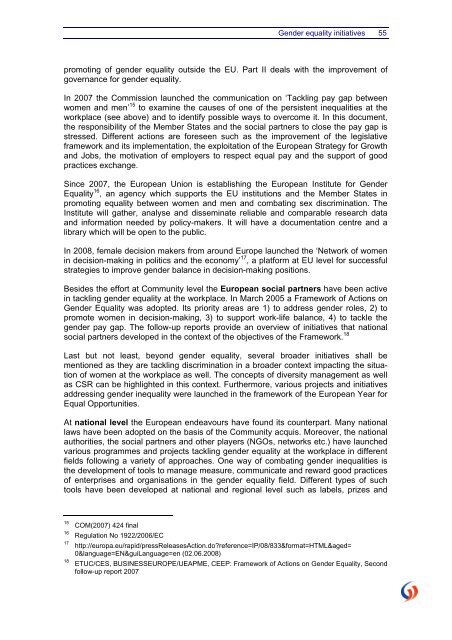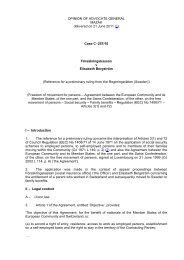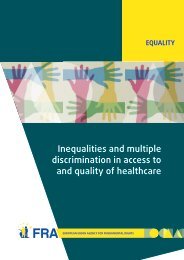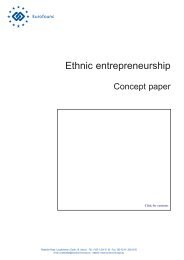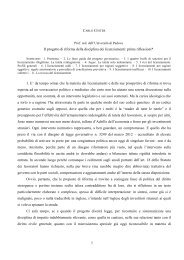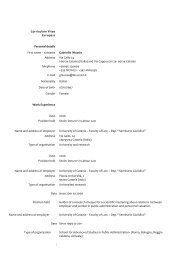Study on non-legislative initiatives for companies to promote gender ...
Study on non-legislative initiatives for companies to promote gender ...
Study on non-legislative initiatives for companies to promote gender ...
You also want an ePaper? Increase the reach of your titles
YUMPU automatically turns print PDFs into web optimized ePapers that Google loves.
Gender equality <strong>initiatives</strong> 55<br />
promoting of <strong>gender</strong> equality outside the EU. Part II deals with the improvement of<br />
governance <strong>for</strong> <strong>gender</strong> equality.<br />
In 2007 the Commissi<strong>on</strong> launched the communicati<strong>on</strong> <strong>on</strong> ‘Tackling pay gap between<br />
women and men’ 15 <strong>to</strong> examine the causes of <strong>on</strong>e of the persistent inequalities at the<br />
workplace (see above) and <strong>to</strong> identify possible ways <strong>to</strong> overcome it. In this document,<br />
the resp<strong>on</strong>sibility of the Member States and the social partners <strong>to</strong> close the pay gap is<br />
stressed. Different acti<strong>on</strong>s are <strong>for</strong>eseen such as the improvement of the <strong>legislative</strong><br />
framework and its implementati<strong>on</strong>, the exploitati<strong>on</strong> of the European Strategy <strong>for</strong> Growth<br />
and Jobs, the motivati<strong>on</strong> of employers <strong>to</strong> respect equal pay and the support of good<br />
practices exchange.<br />
Since 2007, the European Uni<strong>on</strong> is establishing the European Institute <strong>for</strong> Gender<br />
Equality 16 , an agency which supports the EU instituti<strong>on</strong>s and the Member States in<br />
promoting equality between women and men and combating sex discriminati<strong>on</strong>. The<br />
Institute will gather, analyse and disseminate reliable and comparable research data<br />
and in<strong>for</strong>mati<strong>on</strong> needed by policy-makers. It will have a documentati<strong>on</strong> centre and a<br />
library which will be open <strong>to</strong> the public.<br />
In 2008, female decisi<strong>on</strong> makers from around Europe launched the ‘Network of women<br />
in decisi<strong>on</strong>-making in politics and the ec<strong>on</strong>omy’ 17 , a plat<strong>for</strong>m at EU level <strong>for</strong> successful<br />
strategies <strong>to</strong> improve <strong>gender</strong> balance in decisi<strong>on</strong>-making positi<strong>on</strong>s.<br />
Besides the ef<strong>for</strong>t at Community level the European social partners have been active<br />
in tackling <strong>gender</strong> equality at the workplace. In March 2005 a Framework of Acti<strong>on</strong>s <strong>on</strong><br />
Gender Equality was adopted. Its priority areas are 1) <strong>to</strong> address <strong>gender</strong> roles, 2) <strong>to</strong><br />
<strong>promote</strong> women in decisi<strong>on</strong>-making, 3) <strong>to</strong> support work-life balance, 4) <strong>to</strong> tackle the<br />
<strong>gender</strong> pay gap. The follow-up reports provide an overview of <strong>initiatives</strong> that nati<strong>on</strong>al<br />
social partners developed in the c<strong>on</strong>text of the objectives of the Framework. 18<br />
Last but not least, bey<strong>on</strong>d <strong>gender</strong> equality, several broader <strong>initiatives</strong> shall be<br />
menti<strong>on</strong>ed as they are tackling discriminati<strong>on</strong> in a broader c<strong>on</strong>text impacting the situati<strong>on</strong><br />
of women at the workplace as well. The c<strong>on</strong>cepts of diversity management as well<br />
as CSR can be highlighted in this c<strong>on</strong>text. Furthermore, various projects and <strong>initiatives</strong><br />
addressing <strong>gender</strong> inequality were launched in the framework of the European Year <strong>for</strong><br />
Equal Opportunities.<br />
At nati<strong>on</strong>al level the European endeavours have found its counterpart. Many nati<strong>on</strong>al<br />
laws have been adopted <strong>on</strong> the basis of the Community acquis. Moreover, the nati<strong>on</strong>al<br />
authorities, the social partners and other players (NGOs, networks etc.) have launched<br />
various programmes and projects tackling <strong>gender</strong> equality at the workplace in different<br />
fields following a variety of approaches. One way of combating <strong>gender</strong> inequalities is<br />
the development of <strong>to</strong>ols <strong>to</strong> manage measure, communicate and reward good practices<br />
of enterprises and organisati<strong>on</strong>s in the <strong>gender</strong> equality field. Different types of such<br />
<strong>to</strong>ols have been developed at nati<strong>on</strong>al and regi<strong>on</strong>al level such as labels, prizes and<br />
15<br />
16<br />
17<br />
18<br />
COM(2007) 424 final<br />
Regulati<strong>on</strong> No 1922/2006/EC<br />
http://europa.eu/rapid/pressReleasesActi<strong>on</strong>.do?reference=IP/08/833&<strong>for</strong>mat=HTML&aged=<br />
0&language=EN&guiLanguage=en (02.06.2008)<br />
ETUC/CES, BUSINESSEUROPE/UEAPME, CEEP: Framework of Acti<strong>on</strong>s <strong>on</strong> Gender Equality, Sec<strong>on</strong>d<br />
follow-up report 2007


